Writing a compelling sales copy is hard. Your reader must go from the first sentence to the next, and then the next. Until they buy.
Businesses understand that a compelling sales copy is the key that unlocks revenue growth.
The problem?
They have no idea how to use that key. As a result, more than 40% of companies under-invest in their content quality.
To help businesses make sense of their sales copy, I talked to Jon Morrow.
There’s probably no better person to talk to—Jon lives on copy, literally. He’s generated over $50 million with copywriting and taught countless writers and content teams of multimillion-dollar businesses how to win with copy.
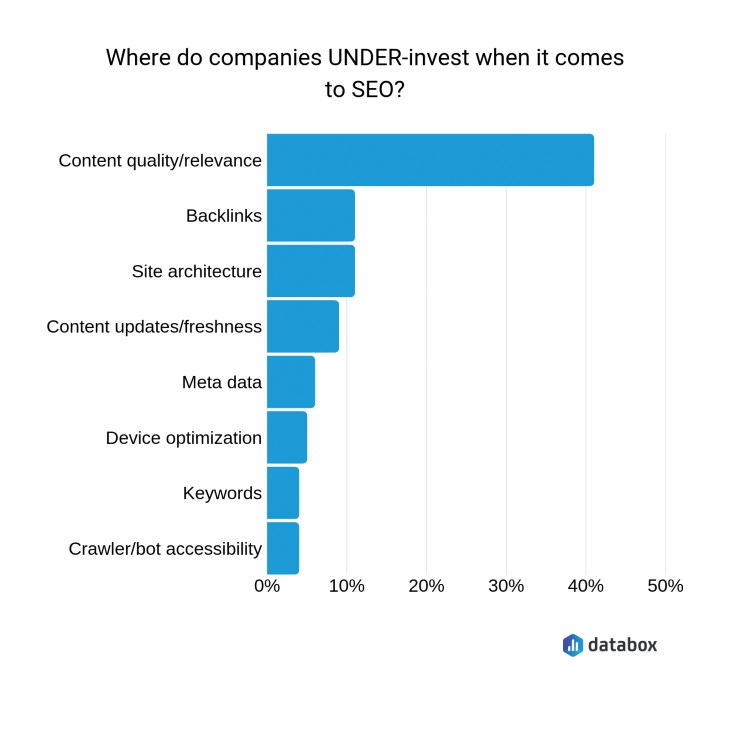
In this interview, Jon Morrow shares his secrets and tactics for creating multimillion-dollar copies.
Key Takeaway from the Interview
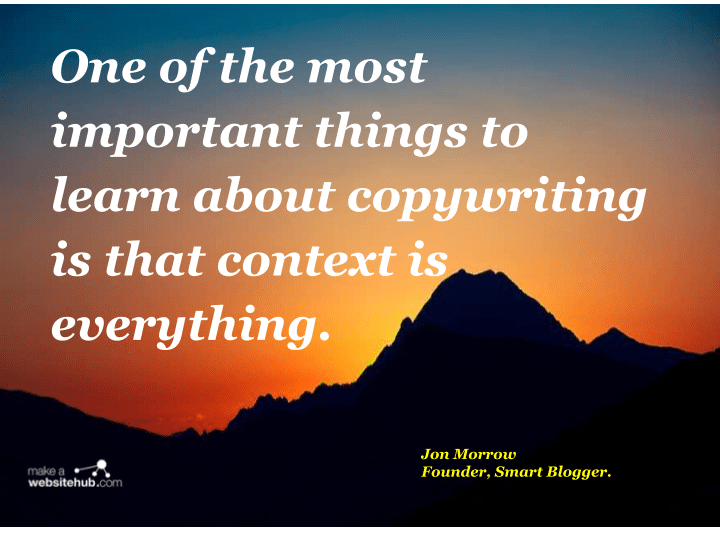
This interview explains how Jon Morrow writes great thought leadership and how small businesses can scale fast with content.
Here are some key points to note:
- In copywriting, context is everything. So, understand that what grabs your audience’s attention in an email subject line might not interest them in a Facebook post.
- Storytelling is the most powerful way to grab your audience’s attention. So, craft your content with compelling stories.
- To grab people’s attention, you need to break their expectations. Don’t tell them what they expect you to say, or you’ll automatically lose them.
- In addition to the best copy, let your product also deliver value. Build a product that delivers results for the customer in a repeatable, systematic way.
- To make your copy attractive to potential buyers, try to simplify your offer in a simple sentence that anyone would understand
- If you want to be really good at thought leadership, you need to be really good at thinking in ways that no one else is thinking.
- The second rule of business is to make an offer for your product that’s so good that people feel like idiots if they say no.
- Grow your network by seeking out intelligent people whose level of intelligence makes you feel stupid , that’s how to become a better thinker.
- To produce the best thought leadership content, understand your topic and space. Then communicate those ideas in an interesting and novel way.
My Conversation With Jon Morrow

1. My first question reminds me of an interview where you said it was the most difficult question to start with. The question then was: Introduce yourself. But, I’d like to ask you to tell us something about yourself that you don’t share so often?
There are lots of things that will go into this category.
Probably the first one is, despite having a supposedly fatal disease, I plan on living forever—at least for hundreds of years. That’s what most people would consider a very bizarre thing.
Most people think that the most interesting part of my story is that I’ve built some of the world’s most popular content online. And without being able to move from the neck down, my content has made millions of dollars.
But I actually think the most interesting part of my story is a part that I haven’t even started to talk about yet. A few years ago, I started dating. And it’s the story of a guy who can’t move from the neck down.
He wants to know what it’s like to fall in love. And to me, that’s an even more interesting story that I look forward to telling at some point in the future.
2. I look forward to hearing that story.
So, what you have now as Smart Blogger used to be Boost Blog Traffic. I was wondering why you made that change.
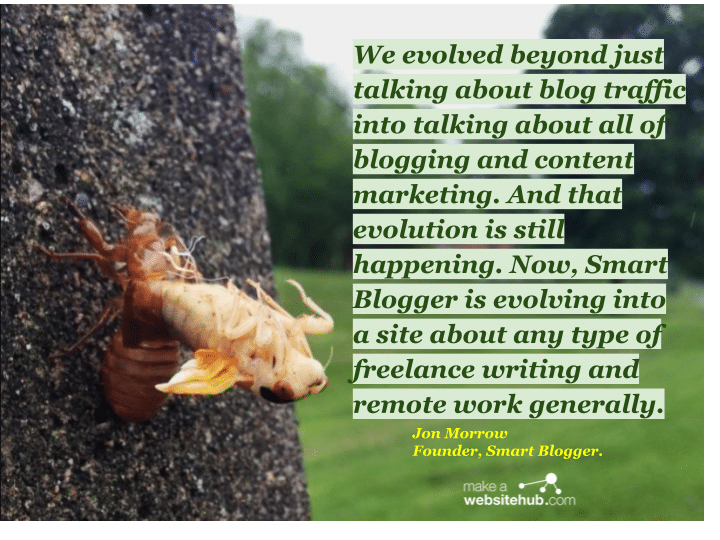
I made the change because we evolved beyond just talking about blog traffic.
I managed Copyblogger with Brian Clark and Sonia Simone for about four years, for anyone who’s not familiar with this.
And I got to be known as the traffic guy. I could make things go viral. I could make things rank on search engines.
So I capitalized on that branding and I started Boost Blog Traffic because it’s what everyone wanted to know at the time.
Since then, we evolved into talking about all of blogging, content marketing, and that evolution is still happening.
I wouldn’t be surprised if, at some point over the next few years, we change our domain name again. Smart Blogger is evolving from just a site about blogging into one with any type of freelance writing or even working remotely in general.
So, those evolutions are always happening, and the domain name will eventually have to change.
3. So no one listens to you when you ask to be called “His Royal Awesomeness.” So tell us, how did Jon go from being a blogger to being “His Royal Awesomeness?” What’s the entrepreneurial journey?

Yeah, that’s kind of a joke. Although I don’t know where it came from or where it started.
It started sometime back in the Copyblogger days, about ten years ago. And some of my students still call me that or HRA for short.
How did I get to where I am? It could be a whole book, but I’ll try to give you the short version.
I started working at first as an editor at CopyBlogger. Before that, I was just a freelance writer. Brian Clark saw that I had potential and brought me on.
So, I made a very strange deal with Brian. Instead of paying me, he would owe me a favor one day, and he couldn’t say no. And I worked over 40 hours a week for one or two years before I finally cashed in that favor.
And the favor was that I was going to start my own consulting agency and that Brian would introduce me and endorse me as a consultant.
He had never done that for anyone before. So he sent an email to about 80,000 Copyblogger subscribers. And the next day, I had 300 clients and a waiting list for every six months. And that one email ended up making me probably at least a million dollars.
I did that for a while but continued to write for them. Then I went to work with Neil Patel over at Kissmetrics for a short time.
Some people aren’t aware of that because it was only a few months. Then, I decided I was going to branch off on my own.
So I started my own training program. At the time, I was teaching guest blogging. And I went to work, building and training Neil’s staff. And that included lectures and work.
I quickly became their lead editor and took them to over a million visitors a month. But I only worked there for three months because I had trained the team, and my work was taking off.
So I’d bowed out of that and eventually started my own site. And since then, fast forward years later, and we’re now a team of 13 people. Everyone works remotely, making seven figures in revenue every year, the largest writing website globally, with over 50,000 customers.
So yeah, it’s grown and become very successful,, and I’m very grateful and blessed for all of it.
4. What makes your content unique? Now I could answer that question for myself, but I want you to talk about it. How do you manage to create provocative thought leadership in your content?
One of the things you realize when you start working on content for a long time is that different types of content require different skill sets.
If you want to write search engine content, meaning content that ranks on Google, you need to be very good at on-page SEO. You need to be very good at optimization, link building, everything that makes it work.
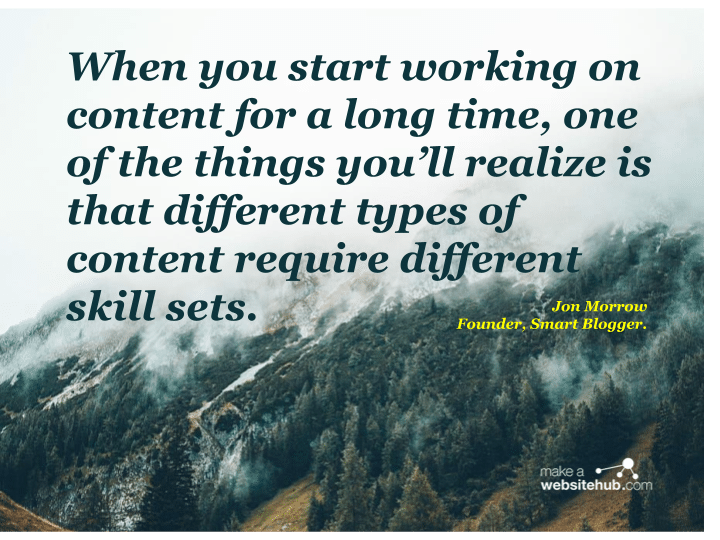
If you want to write content that goes viral on social media, you need to be very good at storytelling, feeling emotion and causing people to feel emotion with what you write.
But, if you want to be really good at thought leadership, you need to be really good at thinking up ideas. Also, come up with ways of approaching things that no one else ever has.
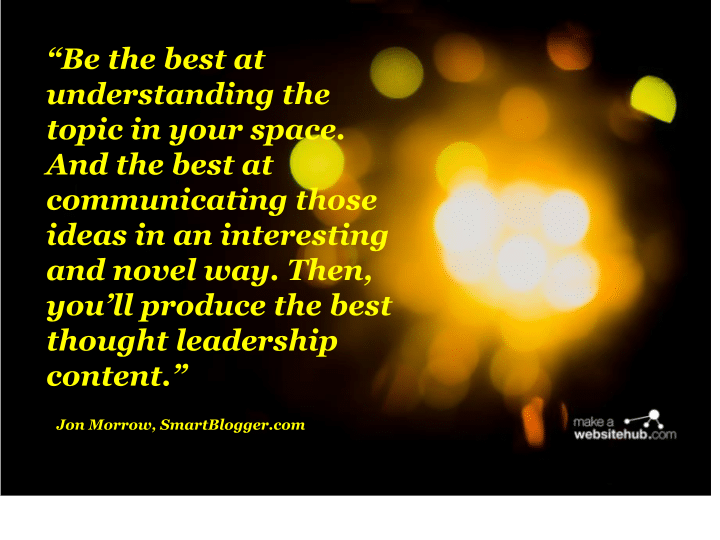
The easiest way to do that’s to be a contrarian. To basically make a list of all of the things people believe, and then ask yourself in what circumstances could these beliefs be wrong. But there are other ways too.
However, the correct answer and the very ‘probably unsatisfying answer’ is thought leadership doesn’t actually depend on your writing skill. It depends on
- Your thinking skill
- How good you are at seeing biases
- How many other intelligent people you’re talking to in your space.
- How much you think about your topic, and
- Your understanding of the topic.
To produce the best thought leadership content, you must understand your topic and space the most. Then, you must communicate those ideas in an interesting and novel way.
So the contents that I published are along those lines; that’s why it gets so much attention. It’s not so much because of the writing. It’s because of the thinking that’s in it.
But other writing that I’ve done succeeded in those other two areas because I also developed skillsets for those other types of content.
I’ve been at this for more than ten years now. So I’ve mastered every skill set for creating every type of content. And you can see that in the result.
But that’s a distinction that most people don’t make. They think all content is the same, and that’s really not.
5. How do you develop the thinking skill set? What do you invest in, what do you do to develop that ability to think and become a thought leader?
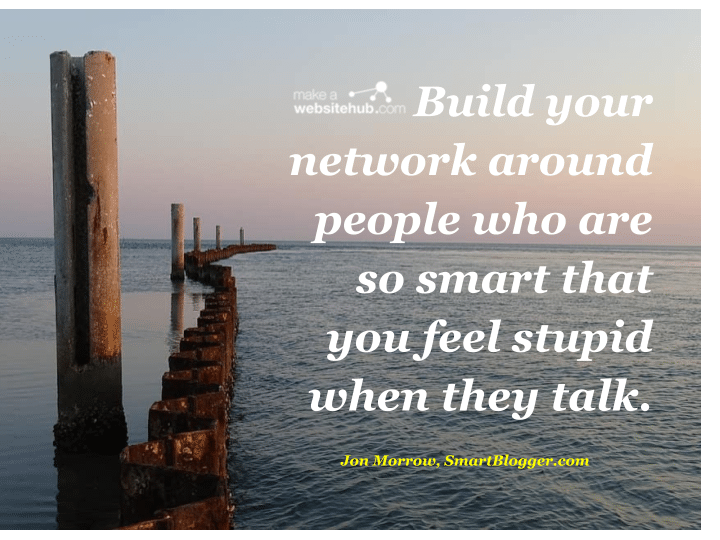
To give you very practical advice, I’d say become a voracious learner for years. Even today, I read for two to three hours a day.
I also listen to a lot of podcasts, and I listen to them at double speed, so I can listen to twice as many.
Every day during lunch, as my regular lunchtime activity, I turn on either a course or a recording of a conference at double speed. So I’m sitting there eating lunch, watching a conference that already happened, at double speed. And I do that every day.
So when you consider the amount of learning that goes into that and the amount of exposure to other people’s ideas, that’s immensely more than most people.
The other tip I would give you is to surround yourself with extremely intelligent thought leaders as well. Start building a network with smart people that make you feel stupid when they talk.

I search for those people. I befriend those people. And so, most of the conversations I have with them are different from what most other people have.
I talk about extremely high-level thoughtful content with extremely intelligent, thoughtful people all the time. Leaving it bare.
The best illustration I can use is marinating a piece of meat. If you’re going to cook a piece of meat, you marinate it to whatever flavor you want it to have.
In this case, to improve the quality of your thoughts, you marinate your brain in intelligence and quality thought. If you do that, then you’ll start to produce it yourself.
6. I understand that most of these kinds of people are really busy people. So, how do you initiate those kinds of relationships?
Those kinds of people are interested in other types of people like themselves.
A good example is my relationship with Seth Godin at the beginning of my career. I befriended Seth Godin before I was anyone. Before I even started writing for CopyBlogger, I became friends with Seth Godin.
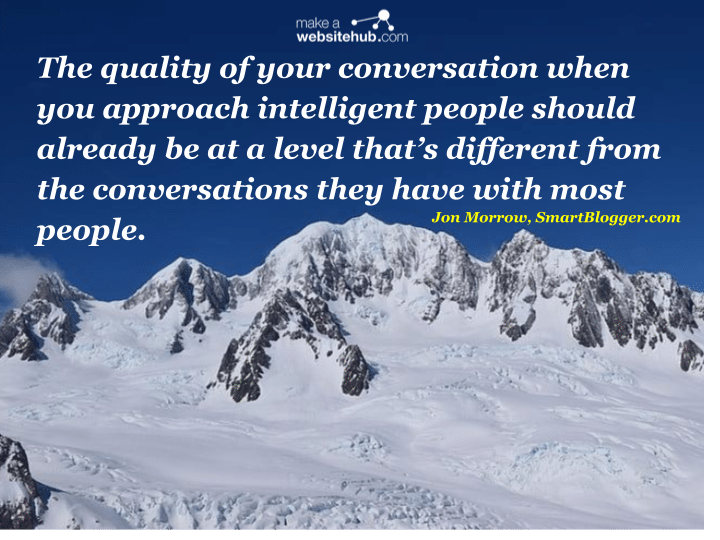
He created an ebook, and I wrote something about the ebook and sent it to him. It was interesting, and it started a conversation.
Then I convinced him to let me interview him. And I asked him questions that no one had ever asked him before. Thoughtful, intelligent questions for that one-hour interview with Seth, I probably spent 50 hours preparing.
And because of that, the conversation was unlike most conversations that he had.
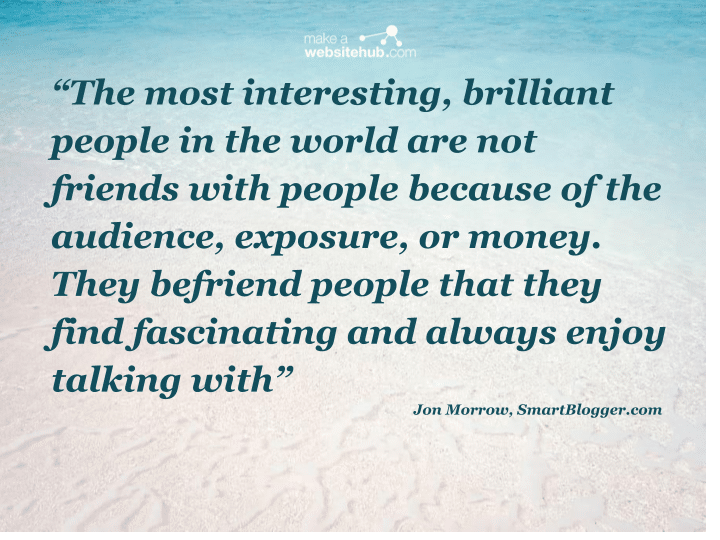
I am assuming that you’ve been reading a lot, listening to many podcasts, which is something that anyone can do.
When you approach those people, the quality of your conversation should already be at a level different than most conversations they have with most people.
That in itself will make them at least a little bit interested in talking to you. And what people don’t understand is that the most interesting, brilliant people in the world are not friends with people because of the audience, exposure, money, or other things like that.
They’re friends with people who they find fascinating and to whom they always enjoy talking with.
So if you become one of those people, and if you develop a reputation for one of those people. Eventually, you reach the point where you can connect with anyone.
And at this stage of my career, it’s easy because I built a reputation as one of those types of people. But it didn’t start that way. It started with reading books, listening to podcasts, and so on.
7. In one of your interviews with James Altucher, You claimed that you had a gun to your head at the time. It’s been a while now, so things have morphed. What new motivations do you have now?

It’s an interesting question because my life has changed a lot. For years I was motivated by just not ending up in a nursing home—by survival.
To put it simply, I was motivated by fear. I was motivated by the gun to the head.
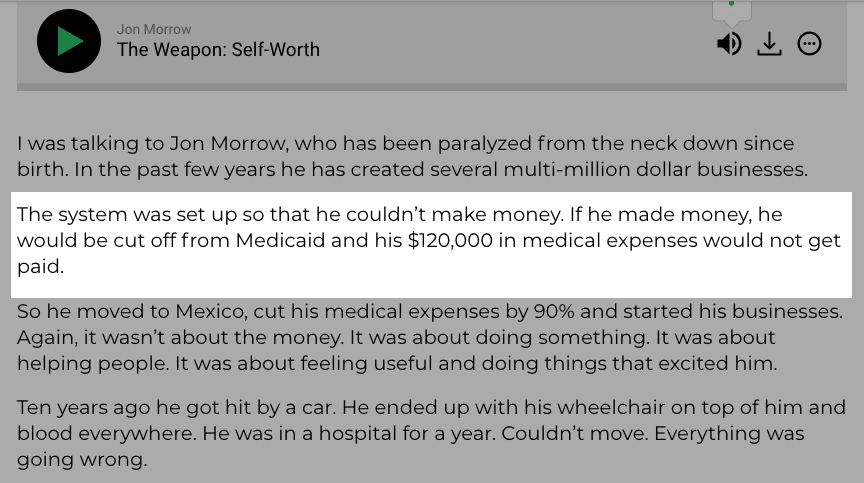
And slowly, the way I think about things has changed as I reach a point in my life where there’s almost no risk of me ever ending up in a nursing home. There’s almost no risk of me dying.
I have the best medical care in the world. I have powerful friends all over the world. I’ve made tons of money.
So none of those things are realistic concerns anymore. There was no fear or anything to push me.
And what changed for me is I stopped being motivated by fear.
And I started being motivated by the question of “if I could make any change in the world, what would it be?” And I started thinking about what it is that I have the strength to do to help other people. And then I built a team around me to help accomplish those things.
So my mission right now is, we’re building the most successful content marketing training school in the world.
We actually just launched a new program for a long time where we’re guaranteeing people that their first article would pay them at least $200.
We enrolled over a thousand students, and tons and tons of people were able to do that. I think we only ended up refunding like two people.
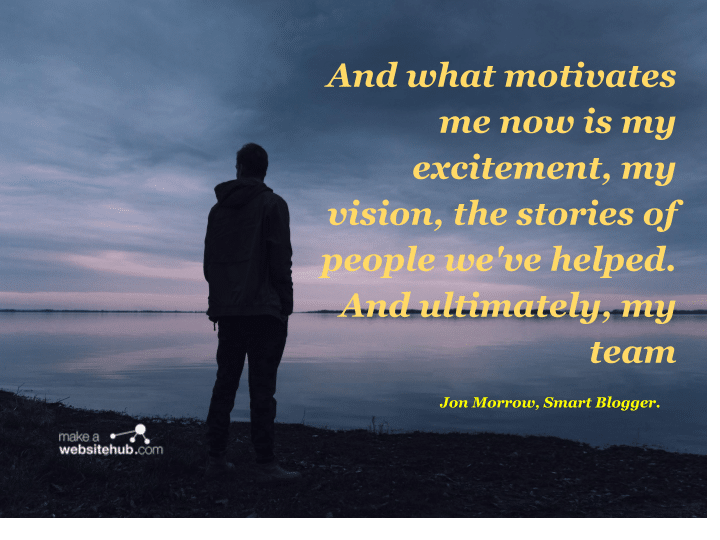
There were a thousand who said they were able to get the work. But now we’re actually launching a new program where we actually guarantee the graduates a full-time job—paying at least $50 000 to $60,000 per year.
That’s a guarantee you’ll never find in a university, even though they should give such assurance. I believe that if you’re going to promise people an education, you get the job.
Then if you don’t deliver the job, you are not delivering on your promise, and you don’t deserve to get paid. It’s a philosophical way of thinking.
So, ultimately what we’d like to do is train people, not only for content marketing but for every type of remote job. And become a new type of university where every graduate is guaranteed a job. So that’s the vision for the future.
And what motivates me now is my excitement about that vision and the stories of people we’ve helped. I’d literally have dozens, or maybe even hundreds of videos and testimonials from people now who report a change to their life that they’re
- Working a new job
- Making more money
- Able to buy a new house
- Able to travel, and so on
I go through those every day, and that gives me motivation.
And most of all, I’m motivated by my team.
Another big transition that I made is learning to be a boss.
I used to see myself as a writer. I still do to some extent. But I slowly learned what it takes to be a CEO—a boss.
And I learned the value of having a team to amplify the work that you were able to do. And nowadays, honestly, the biggest motivation is I make commitments to my team unto what the company will do and what I’ll do.
And those commitments, when everyone is putting their trust in me to move the company forward, motivates me more than anything else because I can’t let my team down.
They’re all looking to me to bring the company forward. So there is no gun to my head now. It’s almost the opposite.
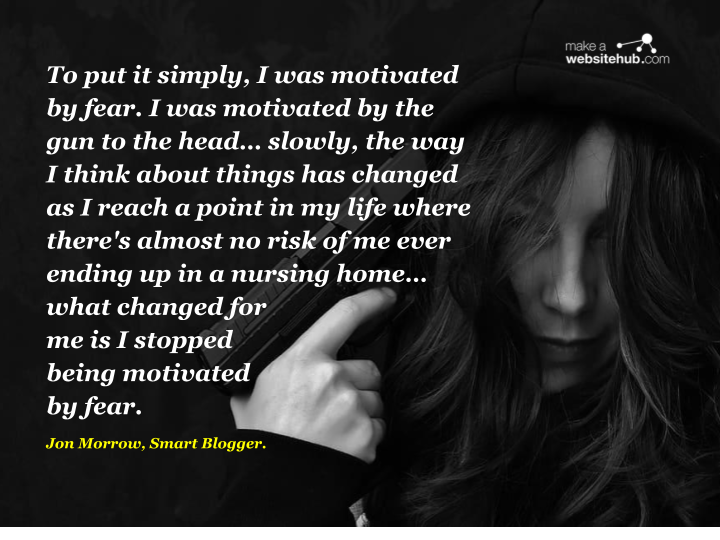
That’s more of where I am now. I don’t think there’s anything short of my death that could make me change course.
But it comes from an entirely different place. It’s a desire to help other people and that desire to be the person that all of my team and all of my students need me to be to lead them forward.
That’s where my motivation comes from.
8. You launched your blog to a ready audience of 14,000 subscribers. Is building a list ahead of launching a blog or product still the best way to go today, should content forerun list building, or should they go hand-in-hand?

The world has changed.
Let me give you two answers: the short answer and the long answer.
The short answer is you should absolutely build your list first. But also to realize that the internet as a whole is constantly in the state of maturing and changing.
You can see a similar cycle if you look back to the 1940s and 1950s to the beginning of television. Television shows used to be one person in the camera at the very beginning.
That was their equivalent of one person starting a blog, of one person starting a YouTube channel. Now it’s evolved to where television shows are fifty to a hundred million dollar projects like Game of Thrones, with thousands of people working on them.
And this is 50 years later.
The same thing is happening on the web.
So, what I would say is there’s even a step before building your list, and there’s even a step before you content or anything like that.
And that’s to figure out what can you do that’s not being done and how can you build a team and a real business around it?
The days of people starting from nothing by themselves are slowly coming to an end. It’s becoming impossible to stand out as an individual blogger. And unless you are a freak. Someone who’s freakishly talented. Freakishly smart.
The better approach, I think, is to look at it like you’re starting a software company or you’re starting any other type of creative business. Look at:
- The market
- Your value proposition
- Your growth mechanism
- Understanding how all of that fits together.
And if that’s intimidating to you, I’d recommend that you do the same thing people do on television.
Before you start your own TV show, you go to work on someone else’s TV show. That’s the entryway for most people now.
So I’ve seen tons and tons of students go from nothing to something. Over 90% of my most successful students work for someone else’s site before starting their own.
And I think that’s an important thing to realize. So if you haven’t done that yet, and if everything I just said about starting your business is intimidating, then I would advise developing your skills, going to work for another company.
Everything will start to make sense, you’ll make connections, and then it won’t be as intimidating to eventually go off on your own if you decide to.
9. In your article, How to Be a Copywriter, you said, many copywriters “specialize in a particular type of copywriting and ignore all others.” Should a small business owner focus on any specific type of copywriting? And is there a reason for that?
If I’m going to give really honest advice to a small business, there are prerequisites.
Nobody tells you this, by the way, there needs to be something written about this. You can have the best copy in the world, and it will fail if you’ve not completed certain prerequisites.
On the other hand, you can have the worst copy in the world, and for example, an amazing product and people will buy it. Now, that’s not to say a copy is worthless. It’s not. I’ve written tons of copies and have seen the value.
And here are some of the prerequisites.
Number one, build a product that delivers results for the customer and in a repeatable, systematic way.
We all buy products to achieve a certain result, even to the cup of coffee you drink. You buy a cup of coffee at Starbucks because you want energy, the taste of coffee, or whatever it is that you want. On Valentine’s day, you buy chocolate or flowers for your girlfriend to make her feel loved, valued, and appreciated.
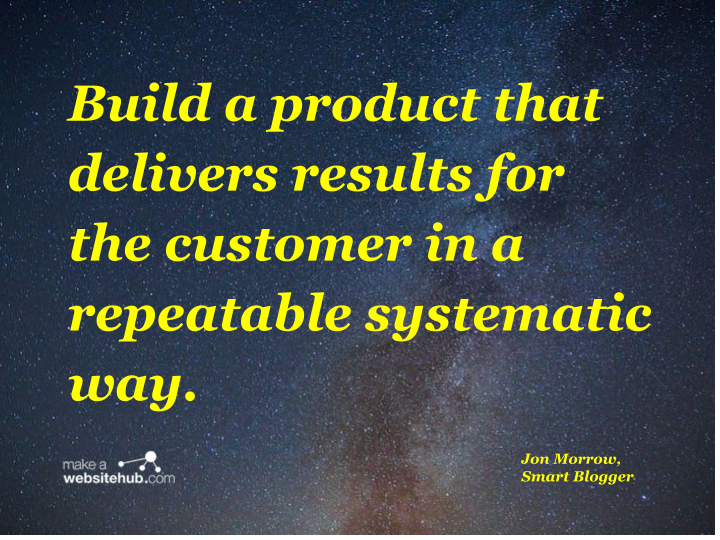
There’s always a result that you’re looking for.
The primary rule of business is you don’t have a business if you don’t have a product that delivers a systematic, repeatable, and dependable result.
Most people violate that, and they wonder why they get stuck when they go bankrupt. It’s because that’s the first rule of business.
The second rule of business is that you need an offer for this product that’s so good that people feel like idiots if they say no. A very classic example would be Dominos and their 30-minute guarantee. It would be there in 30 minutes, or it’s free, although that was years ago.
If you look at my offer with our content marketing school that we’re doing now, you get a job guaranteed, or it’s free, and that’s a $10,000 program, by the way.
That’s how much money is on the line. That’s how confident I am. And it’s because I have a product that delivers a predictable, repeatable, dependable result.
It works. You put those two things in place, and then you write a copy. And your copy can make wonderful things happen in getting people to buy.
On the other hand, the purest copy is actually the offer itself. If you can’t distill what you’re selling down to a single sentence that anyone would understand, chances are your copy isn’t going to work.
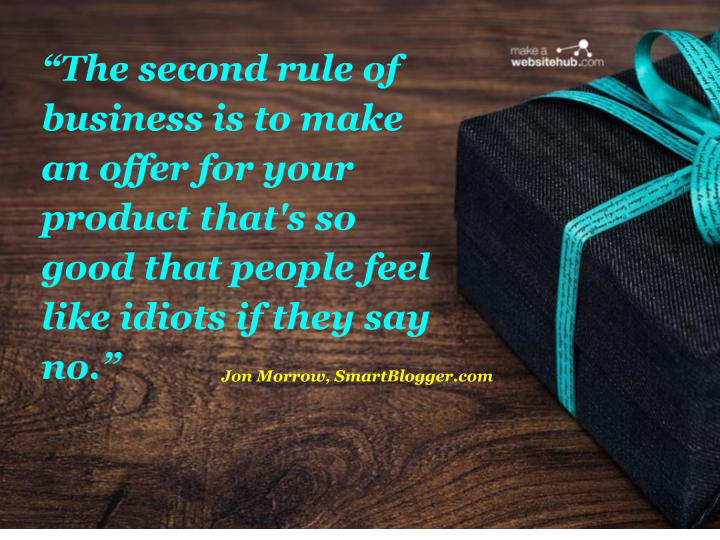
So, if I guaranteed you a full-time job when you finished, would you be willing to study with me for a year and pay me $10,000?
It’s a very simple question and just one sentence. Most people listen to that, and they say, “yeah! Okay! I’m interested, tell me more.
You have to have that in place before you can write a great copy.
After that, you should have all of the other mechanics of good copy that come into play:
- Subheads
- The wording of the guarantee
- The buy button and other parts
But if you don’t get those two things right in the beginning, it’s not going to work.
And the reason why I answered the question that way is that you said, “what advice would you give to small businesses?”
Work on those first two things first, then focus on your copy. And I think you’ll be very happy.
10. What are your top tactics for instantly engaging readers and holding their attention to the end of your copy?
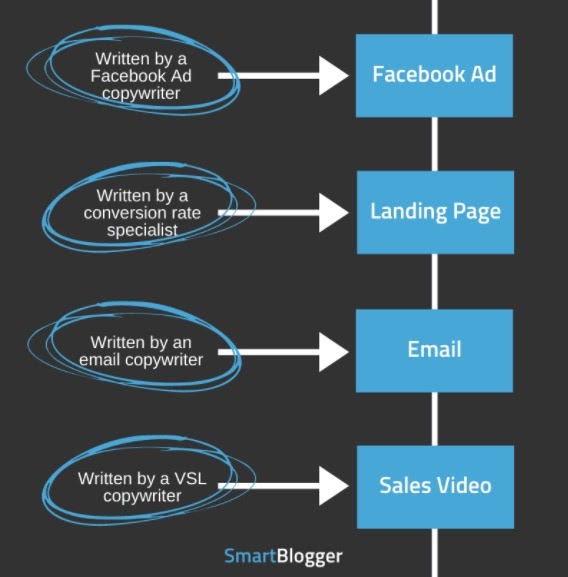
It depends on the type of content. One of the most important things to learn about copywriting is that everything is about context.
So something that grabs your attention in an email subject line is not the same thing that grabs your attention in a Facebook post. And it’s not the same thing that grabs your attention as the opening to a video on a sales page.
All of those things are different. So what you have to do first is consider the context that you’re operating in.
The simplest answer is to use a benefit of some sort to tell people what’s in it for them. That’s a level one approach to all of those things that we just talked about.
But it’s important to realize that whenever you’re trying to get someone’s attention, you’re ultimately trying to generate curiosity. And there are a lot of different ways to do that.
Although it’s one of the most dependable ways, it’s not the most powerful.
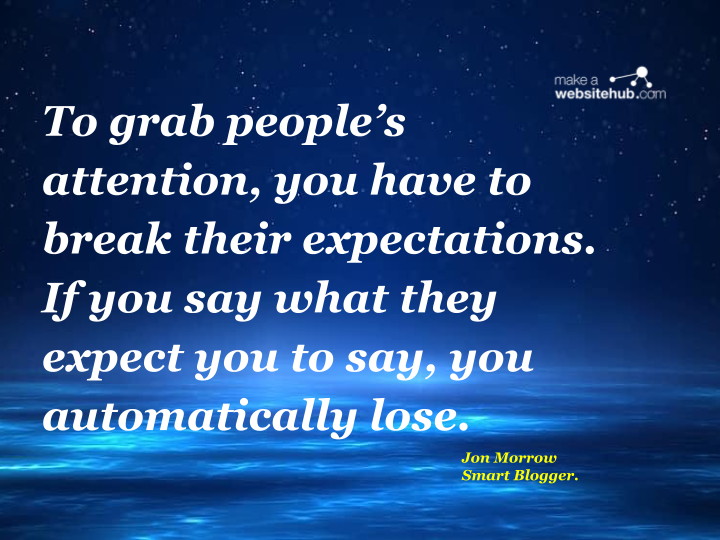
One of the most powerful ways is storytelling. Without a doubt, that’s maybe the most powerful way to grab someone’s attention.
It’s also like level 100, where level one is the benefit?
Storytelling is very difficult to do well. You have to be a master in order to grab people’s attention. And then there are lots of techniques in between.
The simplest answer comes from “Made to stick.” For anyone who hasn’t read this book, it’s one of my favorite books on content by Chip and Dan Heath.
One of the principles is that you have to break people’s expectations.
So if you say what they expect you to say, you automatically lose. That’s the most important thing to realize when it comes to grabbing people’s attention.
11. I told a friend I’ll be interviewing you, she said, “Jon Morrow? That guy is the king of FOMO.” She missed one of your free webinars and followed the link anyway to see if she could find a recording. She didn’t get any.
What came to my mind was that most marketers give you deadlines, then extra deadlines, and even recordings. You don’t do that. So, I’m curious. How has this decision influenced your performance in marketing?
I think it comes from a difference in perspective from what many marketers or companies have.
If you want to generate the most sales out of one webinar, for example, have a recording and don’t tell people about it. But realize that when you do that, the next time, no one is going to believe you.
Bit, if you want to generate the most sales over ten webinars, you don’t have a recording and train people to be there.
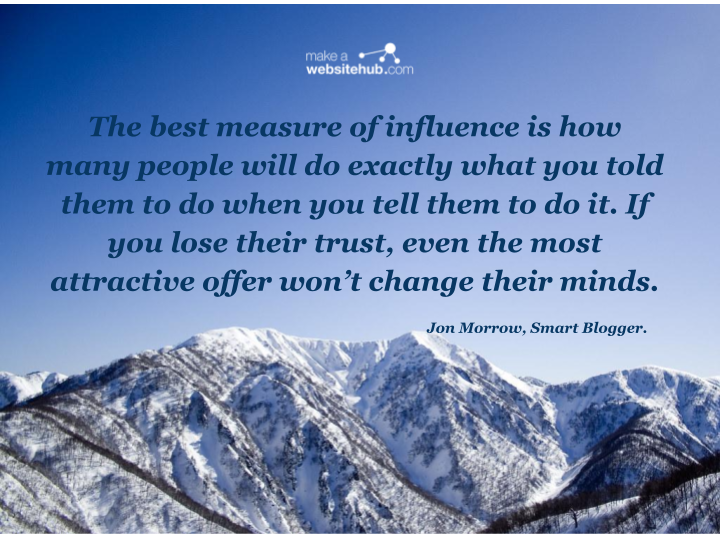
So my perspective is a little bit different. I look at things over the long term.
I think about what I’m teaching my audience because we train people to either trust us or not trust us. To believe in us or not believe us.
And ultimately, I believe the best measure of influence is how many people will do exactly what you told them to do when you tell them to do it.
And if I lie to people, they’ll not want to do what I tell them to do after a while. Even if I have a very attractive offer, they’re not going to believe me or trust me.
And over the long term, I think trust is the most valuable thing you have with your audience. And I think it’s why we’re able to charge higher prices than most people can.
When I say I’m going to charge $10,000 for a program, people aren’t worried that I’m going to steal their money because we’ve demonstrated as a company again and again that we deliver on our promises that we are worthy of their trust.
Even in recording and recording, and small things, whether we record the webinar or not, we do what we say. So that’s deliberate.
And for us, I think the long-term payoff has been enormous.
12. At a time in your career, you wrote 2,000 words a day, seven days a week, every day, for years. How did you achieve that while keeping each piece of content valuable?

I didn’t. Not everything I wrote was good. That’s the other thing to realize. This is a mistake in thinking that I see a lot of people make.
They believe that when they sit down to write their first blog post, record their first video, or do their first broadcast, they’re supposed to be good.
The answer is no. You’re supposed to suck when you do your first anything. It’s your first time.
And when I was writing 2000 words a day in the beginning, when I started that, let’s say out of 14,000 words in a week, maybe a thousand words of that was actually any good.
Now over time, that went up to where it is now in my career; it’s still not 14.
It’s not a hundred percent, but probably 80% when I write. That’s pretty good.
But I’ve been doing this for ten years, more than ten years now. I’ve written more than most people write in their lifetimes.
I’ve written more than many published authors, best-selling authors. So now am I good? I mean, I hope so after dedicating that amount of time to it, I hope so. So, yeah. What I wrote wasn’t originally unique; sometimes, it didn’t even make sense. Sometimes it was offensive.
Sometimes, I look back at some of the things I wrote because I keep everything I wrote. I have everything all the way back to the beginning of my career.
Including all of the things, I never published. And I mean, there were literally tens of thousands of pages of unpublished stuff.
And when you go back and you look at it, there’s a good reason why there’s a problem with all of it. Sometimes I repeated myself too many times.
There are all different kinds of problems.
So if someone is considering doing 2000 words a day, that’s what I would say is don’t concentrate on being good, concentrate on getting better all the time, and seeing that percentage go up over time. That’s what you’re looking for.
13. What’s the best thing anyone ever said about Jon Morrow, Smart Blogger, and what you do?
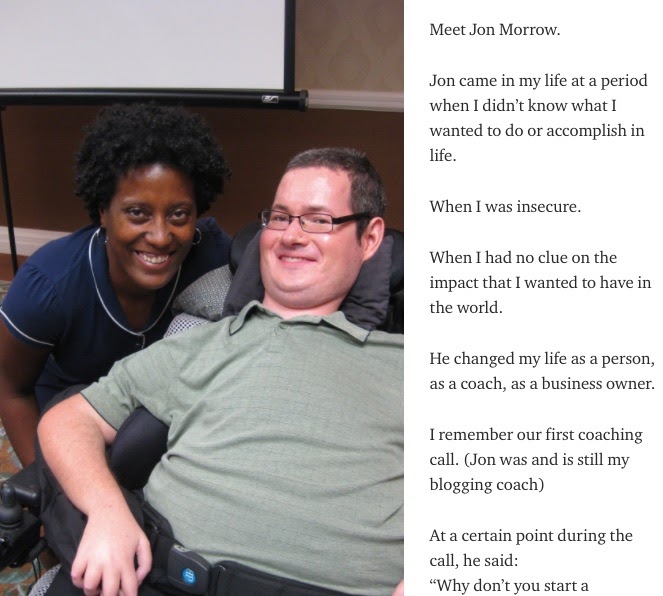
The best thing? I’ll tell you the first thing that comes to mind.
I’ve had two people now who told me that if it weren’t for me and my work, that they would’ve committed suicide, that I found them at precisely the right time.
I said exactly the right things. And they didn’t tell me until much later.
But they told me, “Jon, I was in a really dark place. You came to me exactly when I needed you, and you delivered. My life has improved.
I’m feeling much better about myself. You saved my life. Thank you.
That’s probably the most touching, emotional thing that anyone’s ever said.
14. What one thing do you think more people should know about Smart Blogger?
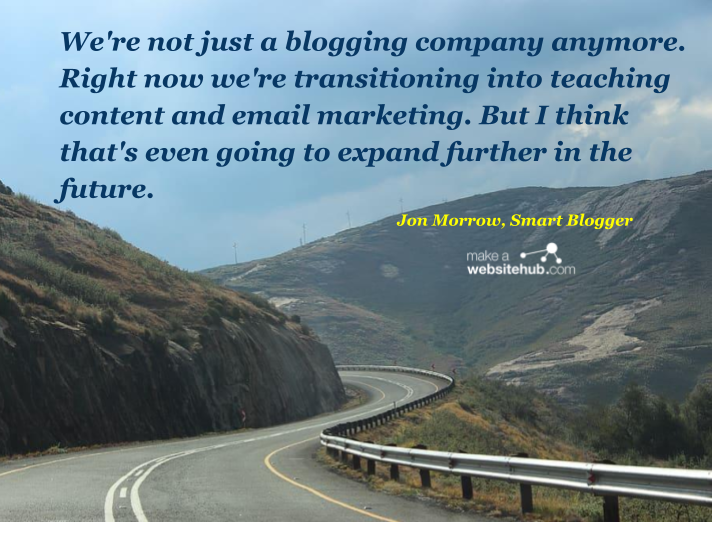
It’s that we’re not just a blogging company anymore. Right now, we’re transitioning into teaching content and email marketing. But I think that’s even going to expand further in the future, probably not quickly.
But nowadays, the way the content world is moving is to have a team of people that you’re all working together to achieve a goal. I couldn’t do what I do without my team. It would be impossible.
And the way all other companies are going is building truly exceptional teams. So what we’re trying to do is train the teams of the future that businesses will need.
It’s not a gimmick. It’s real philosophy and desire to train people to do things.
Right now, if you want to become an email marketer or a content marketer, there’s no university with a legitimate program. Zero!
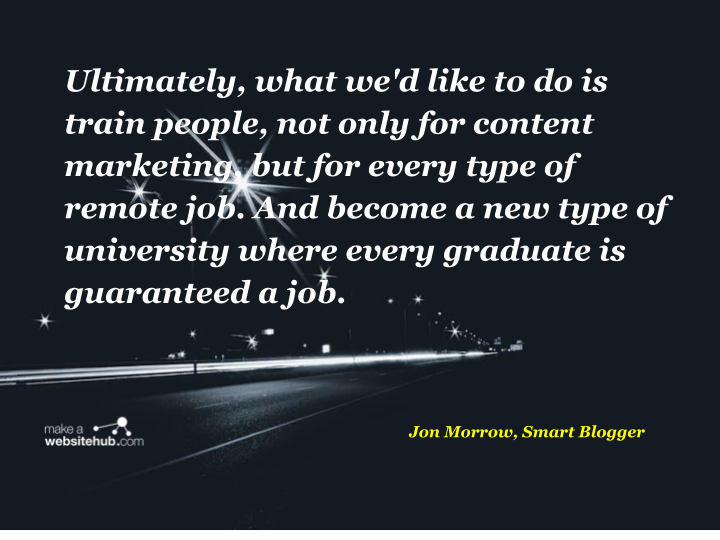
And what that means is there’s a tremendous need.
The last time we did statistical analysis on this, there were 13,000 full-time open content marketing jobs. 13,000!
And yet, there are no degrees and no clear paths to get started. This is absurd! Businesses need to hire these people.
They need to build these teams. They’re out there putting the job offers out, hoping to hire someone. And nobody that applies is qualified.
That’s the situation that we’re in right now, so I want to correct that. I want to go from beyond a blogging company to initially training the
- Content marketers
- Writers
- Editors for the sites, and more.
So that when you graduate, you can fill one of those 13,000 unfilled content marketing jobs.
But then eventually, it’s going to go beyond that—Copywriting, other types of content, and eventually, maybe to other things as well. And everything we do works.
As I said, the fundamental thing in business is to deliver results for your customer. That’s why we have such crazy guarantees and work hard for our students. And that’s where we have so many fans.
So yeah, that’s really what I want someone to know.
About Jon Morrow
Jon Morrow is the CEO of Smart Blogger, a multimillion-dollar company dedicated to teaching people how to blog, get paid to write, and make money online. Since branching off Copyblogger in 2011, Jon Morrow’s business has generated over $50 million in revenue.
Jon started his blogging career at Copyblogger before starting Boost Blog Traffic (BBT) in 2012 which then evolved into Smart Blogger.
Notable for creating viral posts, Jon’s articles have been read and shared by millions. As one of the most successful bloggers in the world, Jon’s content has helped several businesses make millions in revenue online.

Hi Nicholas,
It was a great share! I am a startup owner and content creator. Writing blogs and articles is where I shine, I am comfortable with producing other types of content as well, but writing a sales copy has always been a struggle. Getting advice from such an experienced person will definitely help my process. I learned a lot from this article, and I will definitely implement it in my process. Thanks a lot for such a helpful share!